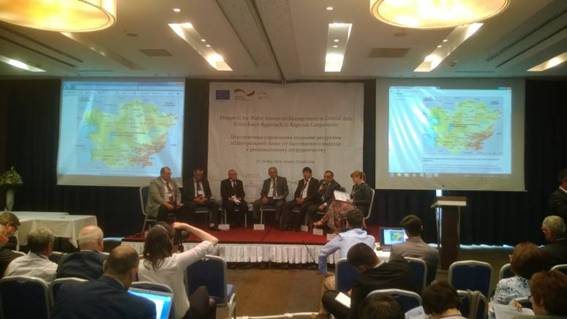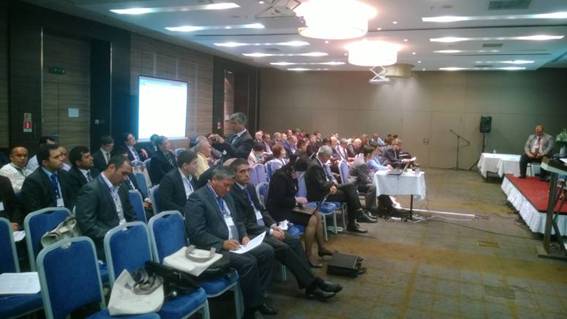REGIONAL CONFERENCE «PROSPECTS FOR WATER RESOURCES MANAGEMENT IN CENTRAL ASIA: FROM BASIN APPROACH TO REGIONAL COOPERATION»
The regional conference “Prospects for Water Resources Management in Central Asia: from Basin Approach to Regional Cooperation” was held in Almaty (Kazakhstan) on the 27-28th of May 2014. This event summarized the results of the two regional programs: the “ Water Management and Basin Organizations in Central Asia” project funded by the European Union, and the Phase II of the “Transboundary Water Management in Central Asia” program supported by the German Federal Foreign office. The aim of the conference was to share experience and knowledge generated in the course of these programs and plan future lines for sustainable water resources management cooperation in Central Asia, especially as part of the expected Phase III (2015-2017) of the German FFO’s program.


The Conference brought together at the high level water agencies from the Central Asian countries, regional organizations (EC IFAS, ICWC, CAREC), and international partners (GIZ, EU, UNECE, SDC, UN Center for Preventive Diplomacy and others). The direct executors of the programs at basin level were also invited to the Conference. SIC ICWC was represented by V.I. Sokolov, D.R. Ziganshina, A.G. Sorokin, G. Solodkiy, and Sh. Muminov.
The first day was dedicated to discussion on basin-wide planning in the Central Asian countries with the focus on the Aral-Syrdarya basin in Kazakhstan, Murgab River basin in Turkmenistan, Padshaota River basin in Uzbekistan, and Isfara River basin in Kyrgyzstan and Tajikistan. Establishment of basin councils and drafting of basin plans were addressed in details.
The positive effects of the measures undertaken with the support of the German FFO and EU included:
- wider involvement of local experts for better ownership of introduced changes;
- coordination of various donors’ activities at the level of basins, where major activities were focused, in order to avoid duplication and share responsibilities for final results;
- refusal from ready-to-implement solutions and search for tailored solutions for specific river basins by stakeholders themselves.
Representatives of the countries and regional organizations were able to share their ideas on future lines of cooperation that needed support from development partners. Particularly, the acting Chairman of EC IFAS Sh.R.Khamraev stressed a need to support activities of the executive bodies of IFAS, further develop human capacities and improve information support of decision making in the area of water management at national, basin, and regional levels, and continue working on safety of hydraulic structures. The Chaiman of the Kazakhstan’s Committee for Water Resources I.A.Abishev designated the following priorities: establishment of the information system and water quality monitoring; forecasting of future development through modeling; further work on regional agreements; and, drafting of a long-term regional water and energy use concept. The Director of Water and Land Reclamation Department of the Kyrgyz Republic K.Tashtanaliev underlined a need for continuing work on transboundary river agreement between Kyrgyzstan and Tajikistan. The Deputy Minister of Tajikistan’s Energy and Water Resources S.N.Rakhimov assigned the following priorities: capacity building of the regional institutes, including ICWC Secretariat; finalization of the transboundary river agreement between Kyrgyzstan and Tajikistan; implementation of national small hydropower projects and development of feasibility studies for medium and large hydropower; support of national water sector reforms, including capacity building of the newly established service for hydraulic structure safety; and, infrastructural investments. The Head of division at the Turkmenistan’s Ministry for Water Resources G. Khanmedov listed among the priorities of future cooperation a need for a regional water quality monitoring project, enhancement of work on water-salt regime monitoring on the basis of European experience, application of modern hydrometry methods, and strengthening of cooperation on the basis of wider recognized international law principles.
The Deputy Director of SIC ICWC Central Asia V.I. Sokolov called upon donors to pay greater attention, alongside with national and bilateral interstate projects, to regional multilateral projects. The three documents - Implementation Plan on strengthening ICWC activities in key directions, the Concept for Developing an Information Network on Water and Related Issues in Central Asia, and the Strategy for Building Capacity on Integrated Water Resources Management in the Central Asian countries - adopted during the 63rd meeting of ICWC in April 2014 could serve as the guidelines for such projects. He also stressed a need to promote work on monitoring in the Prearalie area by establishing there a Water User Association. An important direction is putting the knowledge transfer system for farmers that was developed jointly with SDC in the Fergana Valley right and its transformation into a wider extension service.
A separate session was dedicated to discussion of the results of CAWA Project intending to contribute to a sound scientific and a reliable regional data basis for the development of sustainable water management strategies in Central Asia. The speakers presented scientific work on the analysis of the past and future climate change and its impact on regional water resources (S.Vorogushyn, C.Conrad), socio-economic scenarios for the Fergana Valley (Sh.Muminov), scenarios of future land use and water requirements in the Fergana Valley (I.Dernedde), scenarios of water distribution in the Fergana Valley until 2050 (A.Sorokin), adaptation measures in water management in light of climate change in the Aral Sea basin (G.Solodkiy), methods of water and land monitoring (C.Conrad, F.Loe), monitoring of water resources in the flow formation zones (B.Moldobekov), daily water use planning (G.Solodkiy), and application of the “virtual” water concept in the water use assessments (I.Dernedde).
The Kazakh National Technical University named by K.I.Satpaev hosted on the 27th of May 2014 a research-to-practice conference “Topical Issues in Water Management and Conservation” dedicated to the 80th anniversary of the distinguished hydraulic engineer in Kazakhstan Mr. Nariman Kipshakbaev. V.I.Sokolov took floor at the conference on behalf of SIC ICWC.
|